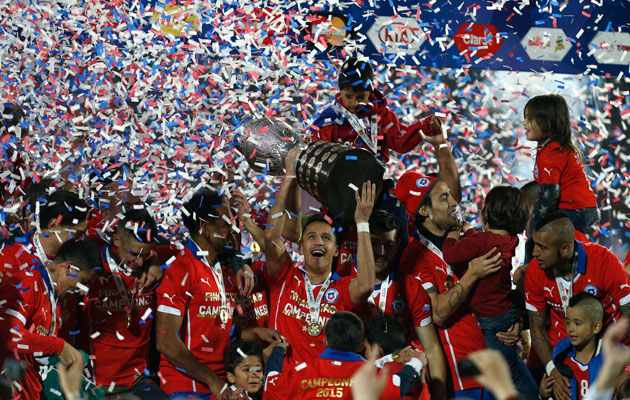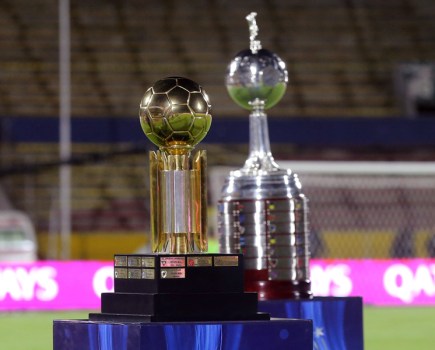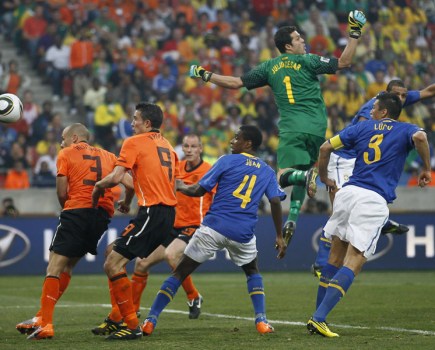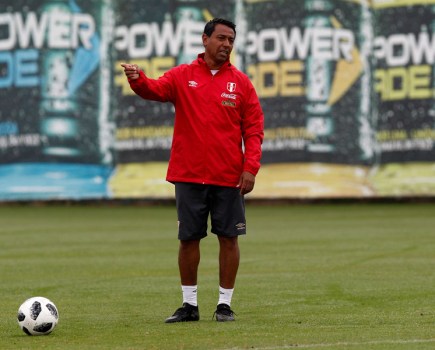FINAL
CHILE 0 ARGENTINA 0 (Chile won 4-1 on penalties)
Chile finally have something to put in their trophy cabinet. After 99 years and 43 previous versions of the Copa America they became the eighth nation to win the competition – and waiting so long left no space for regret that a potentially wonderful final did not come close to living up to expectations.
From the neutrals’ point of view, a 0-0 draw followed by a penalty shoot out was a disappointingly mediocre climax to a tournament which appeared to have been building towards a dream final, between two front loaded sides who attack better than they defend.
But, as Argentina coach Gerardo Martino said after the game, “the two sides did not have the opportunity to show their football. We cancelled each other out. Argentina didn’t shine, Chile didn’t shine. [Lionel] Messi was controlled, el Kun {Sergio Aguero] as well. But then so were Jorge Valdivia and Alexis Sanchez of Chile.”
Why, apart from big match nerves, was this the case? Argentina had shown signs during the tournament of end-of-season tiredness. Martino complained after the group game against Uruguay that his men seemed unable to sustain their rhythm for the full 90 minutes. But in the final, despite coming off the back of a 6-1 semi final thrashing of Paraguay, his team never really established their rhythm.
It must have seemed like Groundhog Day for the Argentines, because so many memories of last year’s World Cup campaign came flooding back; when Angel Di Maria, after a bright start, pulled up injured early on; the way that Messi seemed short of gas, restricting himself to spurts; and the vital chance that fell to Gonzalo Higuain, this time in the last minute of normal time, when the Napoli striker arrived fractionally late at the far post and was unable to steer the ball the right side of the post.

The stalemate also resulted from the fact that Chile worked so hard to defend collectively. Jorge Sampaoli, for the sixth time in six games, changed his starting line up, this time using a back three – Francisco Silva, Marcelo Diaz and Gary Medel – entirely composed of converted midfielders. All were booked in a first half when the momentum seemed to be with Argentina. Chile keeper Claudio Bravo produced a reflex save to block a close range Aguero header from a Messi free kick. And just before the interval he stood up well to stop a shot from Ezequiel Lavezzi, who had replaced Di Maria.
But Chile wrested the initiative after the break. They closed down Argentina in midfield, interrupting the circuit between Messi and Javier Pastore which had proved so effective during the competition. The lung power and unsung versatility of Charles Aranguiz, the motor of the Chile midfield, made him a strong contender for man of the match. Without committing as many men forward as usual, Chile were most dangerous from long balls played behind the slow Argentine defensive line – Eduardo Vargas fired over from one such break in the first half, Alexis Sanchez did likewise in extra time.
After a scrappy game of few chances, both coaches claimed that their team had deserved to win. Gerardo Martino has a case over the 90 minutes. But Chile looked fresher in extra time, and carried that spirit into the shoot out.
The key moment was the third penalty. Mati Fernandez and Lionel Messi had both scored when Arturo Vidal stepped up for Chile. Argentina keeper Sergio Romero if anything did too well, diving too far to his right, so that the ball clipped his arm and went in. And then the hapless Higuain fired over the bar, and Chile were in front. Fittingly, Aranguiz made no mistake, drilling low to the keeper’s left. Argentina’s Ever Banega tried the same side, but Bravo dived to block, and Chile had two chances to seal the win.
They only needed one. Alexis Sanchez, who at times cut a frustrated figure in this Copa, went for the little dink down the middle, Romero was committed to the dive and the Chilean party could begin.
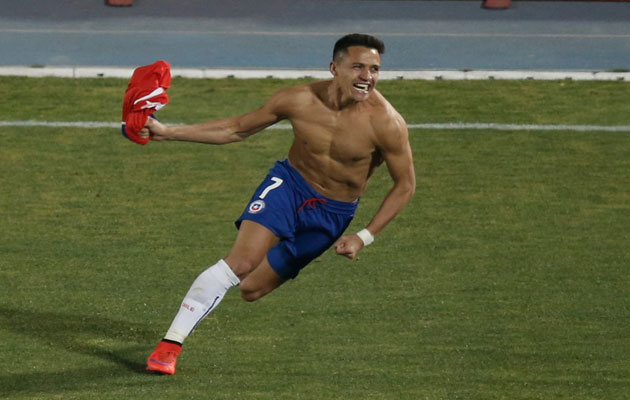
SEMI FINALS
CHILE 2 PERU 1

Chile’s Eduardo Vargas celebrates his second goal against Peru during their Copa America semi-final.
For the first 20 minutes, there looked to be a real chance of a shock result. Peru took the game to Chile, introducing Andre Carrillo on the right of their attack. His pace, and the all round centre forward play of Paolo Guerrero were proving a handful for a Chile defence lacking the suspended Gonzalo Jara. His replacement Jorge Rojas seemed outgunned and there was a nervous hush around Santiago’s National stadium.
But, and not for the first time in his international career, Peru centre back Carlos Zambrano lost his head. He had already been involved in a couple of spats, and was on a yellow, when he received a straight red card for an ugly, unnecessary high footed stamp on Charles Aranguiz.
https://www.youtube.com/watch?v=qPboUM4VQWs
The texture of the game changed. The Peruvian threat remained, but it was now far easier for Chile to play their way into the match. They took the lead, in controversial circumstances, shortly before half time, when a cross-cum-shot from Sanchez came back off the far post and was bundled home by Eduardo Vargas, who should have been given offside. In the second half, though, Vargas scored with a wonderful swivel volley that was wrongly ruled out for the same reason.
A goal and man up, Chile appeared to be heading for a routine win. But their complacency was shattered on the hour. Guerrero sent right back Luis Advincula away, and with his excellent cross heading towards Carrillo, Gary Medel’s attempt to intercept instead diverted the ball past his own keeper.
Home nerves were soon settled, though, with a most un-Chile like goal. Often Sampaoli’s team seem to want to walk the ball into the net. But this time Vargas left fly from 25 metres with a shot that caught keeper Pedro Gallese unawares, and he won the game for Chile with his 22nd international goal – a striking tally for a player who has struggled at club level.
Peru ended up with some consolation for a promising campaign. They deservedly went on to beat Paraguay 2-0 and claim third place.
ARGENTINA 6 PARAGUAY 1
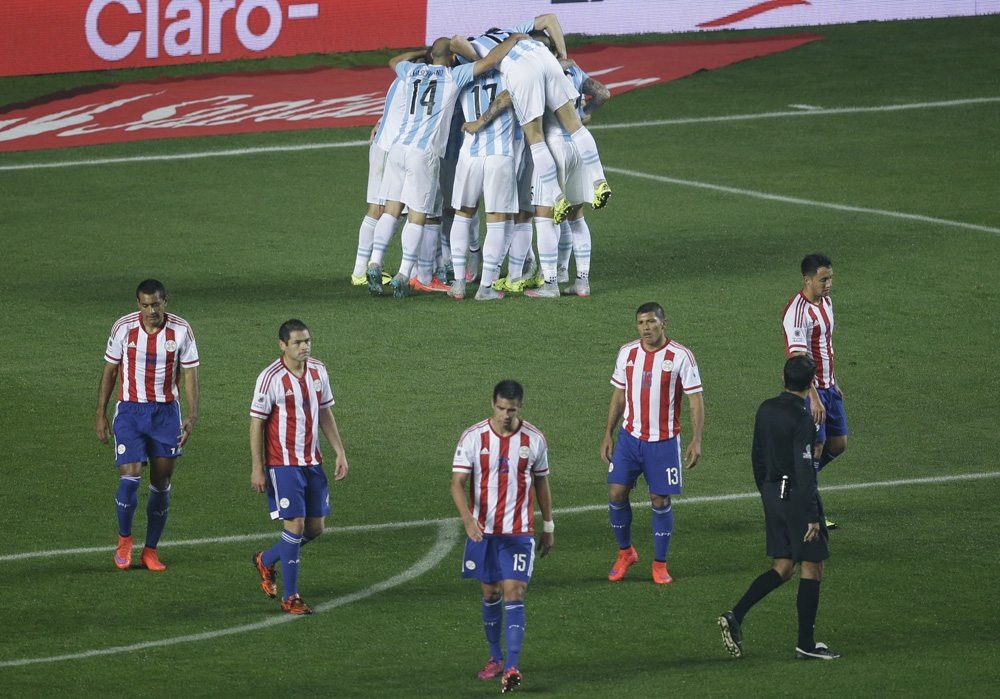
All those goals that Argentina had been threatening to score finally appeared in the second semi final in Concepcion. There was just a moment, though, when the game appeared to be following the same script as the group meeting between these two sides, when Paraguay hit back from two down to achieve a brave and unlikely draw.
Once more Argentina were soon two up. Marcos Rojo forced home the first after a free kick, and Javier Pastore soon added a second with a move that Martino’s men had been working throughout the tournament, Messi dropping deep as a decoy and threading the ball into the space between the lines for Pastore to exploit.
But Paraguay kept pressing, and were rewarded soon before half time when aggressive marking in the Argentina half resulted in a loose ball being smashed home left footed by Lucas Barrios.
Argentina came out after the break, though, determined not to be caught twice in the same trap. This time they would kill off the game on the counter attack, and it took them just 7 minutes to do so. Messi and Mascherano combined to send Pastore away, and he slipped Di Maria for a precise cross finsh. And then Paraguay were caught with too many men upfield, messi took out the defence and Pastore’s cross finish flicked off the keeper to be volleyed home by Di Maria.
There was time for two more, in which Argentina demonstrated their strength at centre forward. First Aguero showed splendid movement to burst between the centre backs and glance Di Maria’s cross into the far corner. Then he was replaced by Higuain, who immediately made his mark, rounding off yet another Messi-inspired move with an emphatic left foot finish.
Argentina, then, had run up a tennis score – and set up a much anticipated final against the tournament hosts.

